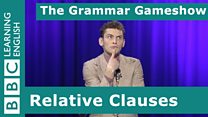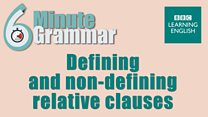Unit 1: The Grammar Gameshow
Test your grammar knowledge
Select a unit
Session 13
Welcome to the Grammar Gameshow! Test your knowledge in this crazy quiz! The presenter is a bit strange, the points don't make sense and the prizes could use some improvement, but at least the grammar is correct!
Session 13 score
0 / 3
- 0 / 3Activity 1
Activity 1
Episode 12: Relative Clauses 2
As the lockdown ends, our contestants arise from a hard night’s sleep to once again take on the mighty relative clause grammar! The only way out, is victory! Will their rough night affect their ability to answer questions? Can Levington ever get something to eat? Will Kate be allowed to finally call her family? Find out in this episode of the Grammar Gameshow!
Watch the video and then test yourself below with our quiz

Will
Hello and welcome to today’s Grammar Gameshow! I’m your host, Will. Could anything be more affirming? And of course, let’s not forget Leslie, our all-knowing voice in the sky.
Leslie
Good morning, everyone!
Will
Today, we’re going to be asking three questions about…
Leslie
Relative clauses! That useful grammar that allows you to modify a noun!
Will
OK! Let’s see how our contestants are doing! Good morning! You spent Saturday and Sunday locked up in our studio due to last episode’s lockdown. Lucky you! There’s nothing quite like a lazy weekend, is there? I feel so refreshed. How was yours?
Levington
So cold…so hungry.
Will
And contestant number two?
Kate
Please, I need a phone. I haven’t been home for days! My family’s going to be worried about me.
Will
No, I’m afraid we block all mobile phone signals in the studio to prevent cheating. Not to worry! Nice to see you both again looking so well. OK. Let’s get going and don’t forget you can play along at home too. Question one. We know that ‘who’, ‘which’, ‘that’ and ‘whose’ can be used as relative pronouns. However, relative adverbs ‘when’ and ‘where’ can also be used for talking about places and times. They can always be replaced by a preposition and ‘which’. Look at these sentences and tell me how to replace ‘when’ or ‘where’. That was the day when I fell in love.
Kate
On which. That was the day on which I fell in love.
Leslie
Correct!
Will
This is the place where I found the money.
Levington
At which. This is the place at which I found the money.
Leslie
Correct!
Will
A bank is a place where you can withdraw money.
Levington
From which. A bank is a place from which you can withdraw money.
Leslie
Correct!
Will
That was the time when the train departed.
Kate
At which. That was the time at which the train departed.
Leslie
Correct!
Will
Leslie?
Leslie
Excellent! ‘When’ and ‘where’ are relative adverbs that describe places or times, and that can be used in the same way as ‘who’, ‘which’, ‘whose’ and ‘that’. However, 'when' and 'where' can always be replaced by ‘which’ and a preposition. The choice of preposition depends on the context, so be careful!
Will
Well done both of you! Three points each. On to question two. We’ve just seen that sometimes relative clauses have prepositions in them. How does the position of the preposition relate to the relative clause’s formality?
Levington
The preposition can be in two positions – immediately before the relative clause or at the end of the relative clause.
Will
Leslie?
Leslie
Well done! The preposition can appear in two positions. If it appears before the relative pronoun, the sentence is more formal – this is in a more written style. If it is at the end of the relative clause, the sentence is less formal – this is more spoken.
Will
Good job. Two points for you. Let’s have a quick-fire practice round, eh? Look at these sentences and tell me if they’re formal or informal. This is the hospital in which I was born.
Kate
Formal.
Leslie
Correct!
Will
There’s the boy (who) I got the book from.
Levington
Informal.
Leslie
Correct.
Will
This is the medicine (which) your friend can’t live without.
Levington
Informal.
Leslie
Correct!
Will
She’s the business person from whom I learned everything.
Kate
Formal.
Leslie
Correct!
Will
And for a bonus point, can you tell me why the last sentence was even more formal?
Kate
Not only is the preposition before the relative pronoun, but the speaker has used ‘whom’, which is an object form of ‘who’ and is also formal.
Will
Leslie?
Leslie
Well done Kate! ‘Whom’ is a relative pronoun used for people, but only when they are the object of the relative clause! It’s quite formal and not spoken much, but it looks nice in writing!
Will
Well done Kate! 66 points for you. It’s time for our last question and then you get to go home…one of you anyway. Question three. The last relative pronoun ‘what’ can also be used in relative clauses, but it is different. Look at this sentence and tell me why. A nice long holiday is what I need.
Levington
As a relative pronoun, ‘what’ means ‘the thing which’. A nice long holiday is the thing which I need.
Will
Leslie?
Leslie
Well done Levington. ‘What’ can be used as a relative pronoun to mean ‘the thing which’. But unlike other relative pronouns, which need or refer to a noun, ‘what’ is the noun and relative pronoun combined, so be careful!
Will
Good job Levington, have…a thousand points. Well, that brings us to the end of today’s Grammar Gameshow. Let’s count out the points…accounting for last show’s points…and the ones today…and a bit of…and carry the… And the winner is Levington! Well done! Here’s what you’ve won!
Leslie
It’s breakfast! So tasty!
Levington
Food!
Will
We’ll see you next week, where you can play for another prize. And Kate, you’ve been through quite an ordeal, eh? Is there anything you want to say before…
Kate
Can I please just call my family? They must be worried sick.
Will
There’s no mobile phone service in the studio, I’m afraid…to discourage cheating. You understand.
Kate
Yes…I suppose…
Will
Call forth the lightning. It looks like we’ll need another contestant. Thanks for joining us. Say goodbye, Leslie.
Leslie
Sayonara, Leslie!
Will
See you next time!
______________________________________________________________________________________
Did you like that? Why not try these?
________________________________________________________________________________________________
Relative Clauses
Two types
There are two types of relative clause: defining relative clauses, which specify which noun we are speaking about, and non-defining relative clauses, which add extra, non-essential, information to a noun. Defining relative clauses almost always sit immediately after the noun they describe. Non-defining relative clauses are introduced and followed by a comma (if they don't end the sentence).
Defining: The pen which I used is on the table. (I mean 'the one I used and no other')
Non-defining: My brother, who is a doctor, lives in France. (The conversation is about where my brother lives)
The following information concerns defining relative clauses only.
When and where
'When' and 'where' are relative adverbs, but function like relative pronouns. 'When' is used to specify a certain time. 'Where' is used to specify a certain place. Both 'when' and 'where' can always be replaced by 'which' and a preposition. This might be done for style or reasons of formality. The preposition being used depends on the context at the time.
I was born during a time when the economy was strong.
I was born during a time at which the economy was strong.
She opened the cupboard where she kept her best glasses.
She opened the cupboard in which she kept her best glasses.
Formality and the preposition
Many relative clauses can contain a preposition, such as 'at', 'on', 'in', etc. This preposition can be in one of two positions. Either immediately before the relative clause, or at the end of the relative clause. The difference relates to formality. If the preposition appears at the end of the relative clause, this is less formal and very common in spoken English. If the preposition appears before the relative clause, this is more formal and more common in written English.
She never met the baby (who) she would give her life for.
She never met the baby for whom she would give her life.
I've just reread the book (which) I first learned English from.
I've just reread the book from which I first learned English.
Whom
'Whom' is the more formal, object only, form of 'who', the relative pronoun for people. These days, many people use 'who' for both subject and object relatives, especially when speaking. However, it's more commonly found in writing. If 'whom' is used in combination with a preposition, put the preposition in the formal position.
The boy from whom I found out about the accident gave me his phone number. (Formal)
The boy (who) I found out about the accident from gave me his phone number. (Informal)
What
'What' is an unusual relative pronoun. It does not refer to a noun that comes before it, or need a noun to follow it. It means 'the thing which' or 'the things which'. Because of this, it is a noun (the thing) and relative pronoun (which) combined. It is less common as a relative pronoun, but still used.
I don't know what I want for dinner.
I don't know the thing which I want for dinner.
I hope you're going to give me what I need.
I hope you're going to give me the things which I need.
To do
Try our quiz to see how well you've learned today's language.
The Grammar Gameshow Quiz
3 Questions
Test your grammar knowledge with the Grammar Gameshow quiz!
Help
Activity
Test your grammar knowledge with the Grammar Gameshow quiz!
Hint
Prepositions in relative clauses can be in one of two positions. Before the relative pronoun or at the end of the relative clause. But which position is the formal one?Question 1 of 3
Help
Activity
Test your grammar knowledge with the Grammar Gameshow quiz!
Hint
'Whom' is the more formal, object only, form of 'who', the relative pronoun for people. If 'whom' is used in combination with a preposition, put the preposition in the formal position.Question 2 of 3
Help
Activity
Test your grammar knowledge with the Grammar Gameshow quiz!
Hint
'What' is an unusual relative pronoun. It does not refer to a noun that comes before it, or need a noun to follow it. It means 'the thing which' or 'the things which'.Question 3 of 3
Excellent! Great job! Bad luck! You scored:
Downloads
You can download the audio and PDF document for this episode here.
More
That's all from Leslie and the contestants for this episode. Why not go to The Grammar Gameshow homepage to watch another one?


